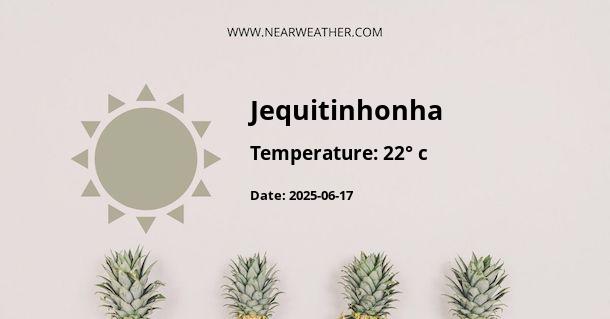Climate and Weather in Jequitinhonha, Brazil
Located in the northern part of the state of Minas Gerais, Brazil, Jequitinhonha experiences a unique and diverse climate that is influenced by its geographical location and topography. The region is known for its rich cultural heritage and stunning landscapes, with the climate playing a crucial role in shaping the local environment and way of life. Understanding the weather patterns and climate variations in Jequitinhonha is essential for both residents and visitors alike.
Temperature
Jequitinhonha experiences a tropical savanna climate, characterized by distinct wet and dry seasons. The average annual temperature in Jequitinhonha is around 23 degrees Celsius (73 degrees Fahrenheit). The region has relatively consistent temperatures throughout the year, with the coldest months being June and July, when temperatures can drop to around 18 degrees Celsius (64 degrees Fahrenheit), and the hottest months being October and November, with temperatures reaching up to 28 degrees Celsius (82 degrees Fahrenheit). The temperature variation is relatively moderate, providing a stable and comfortable climate for much of the year.
Rainfall
The rainfall pattern in Jequitinhonha is heavily influenced by the region's proximity to the Atlantic Ocean and the surrounding mountain ranges. The wet season spans from November to March, with December and January being the wettest months. During this period, Jequitinhonha receives a substantial amount of rainfall, with an average of 150mm to 200mm per month. The dry season, on the other hand, occurs from April to October, with July being the driest month. The average annual precipitation in Jequitinhonha is approximately 1000mm, contributing to the region's diverse and lush vegetation.
Humidity
Due to its proximity to the Atlantic Ocean and the surrounding vegetation, Jequitinhonha experiences relatively high humidity levels throughout the year. The humidity levels range from 60% to 80%, with the wet season seeing higher humidity due to the increased moisture in the air. The humidity adds to the region's tropical feel and significantly impacts the local flora and fauna.
Extreme Weather Events
While extreme weather events such as hurricanes and tornadoes are rare in Jequitinhonha, the region may experience occasional heavy rainfall, leading to localized flooding. The surrounding mountainous terrain can also contribute to the risk of landslides during periods of intense rainfall. It is essential for residents and visitors to stay informed about weather alerts and advisories during the wet season to ensure their safety and well-being.
Best Time to Visit
The best time to visit Jequitinhonha is during the dry season, which spans from April to October. The lower rainfall and pleasant temperatures during this period provide an ideal environment for outdoor activities and exploration. Additionally, the dry season showcases the region's stunning landscapes and vibrant flora, making it a picturesque time for visitors to experience Jequitinhonha's natural beauty.
Conclusion
Jequitinhonha's climate and weather patterns play a significant role in shaping the region's environment and livelihoods of its inhabitants. With its tropical savanna climate, distinct wet and dry seasons, moderate temperature variations, and rich vegetation, Jequitinhonha offers a diverse and captivating experience for those who seek to explore its natural wonders.
A - Jequitinhonha's Latitude is -16.433889 & Longitude is -41.003330.
A - Weather in Jequitinhonha is 23° today.
A - Climate Conditions in Jequitinhonha shows light rain today.
A - Humidity in Jequitinhonha is 98% today.
A - Wind speed in Jequitinhonha is 4.61 km/h, flowing at 85° wind direction. today.
